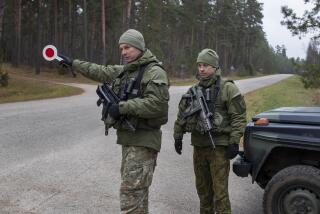Lithuania Gets 2-Day Ultimatum : Soviet Union: Gorbachev threatens to impose an economic embargo if the Baltic republic does not abandon its pro-independence stance.
- Share via
MOSCOW — President Mikhail S. Gorbachev threatened Friday to cut off crucial supplies to Lithuania if the Baltic republic does not back away from its pro-independence stance in two days.
It was the first step toward a long-feared economic embargo in Lithuania, which declared its independence March 11.
Gorbachev did not specify what products would be halted but said they were items the Soviet Union could export to other countries for hard currency.
Such products include oil and natural gas. The small republic of 3.8 million residents is totally dependent on the Soviet Union for those raw materials.
Lithuanian President Vytautas Landsbergis said in reply, “We could have expected worse.”
Gorbachev already has moved to isolate and disarm the Baltic republic and refuses to start negotiations until the independence declaration by its parliament, known as the Supreme Council, is overturned.
Western advisers to the Lithuanian government have said the republic’s economic survival is tied to its ability to maintain its trade with the Soviet Union.
The new threat by Gorbachev was contained in a letter addressed to the Lithuanian government. A text was released by the Tass news agency and reported during the nightly television newscast “Vremya.”
Lithuania has plenty of electrical energy, including a nuclear power plant at Ignalina that can provide virtually all its own needs.
But in addition to being dependent on the Soviet Union for oil and natural gas, in relies on it for repair parts and fertilizer.
The letter, also signed by Prime Minister Nikolai Ryzhkov, said the situation in Lithuania “tightens into an ever tighter knot, assuming the nature of a political dead end.”
The letter charged that Lithuania’s leadership “continues to adopt legislative acts and decisions that set Lithuania in opposition to other (Soviet) republics and the Soviet Union as a whole.”
It accused Lithuania’s parliament of “anti-constitutional actions” including halting conscription into the Soviet army, trying to seize property of the Communist Party of the Soviet Union, and enacting a law April 5 establishing identity cards for Lithuanians “that discriminates against Soviet citizens” in the republic.
If Lithuania’s leaders don’t rescind those actions “within the next two days, instructions will be given to stop supplies to the Lithuanian S.S.R. from other constituent republics of those categories of products that are sold on external markets for freely convertible currency,” the letter said.
In the month since Lithuania declared its independence, the Kremlin has alternated between making threats and conciliatory offers. Soviet troops have occupied some buildings in the capital of Vilnius, and conscripts who refused to serve in the Red Army have been forcibly detained.
The letter did not specifically mention the Soviet demand that Lithuania rescind its declaration of independence, although the Kremlin has called that action unconstitutional.
It said the republic’s Parliament and Cabinet should “restore the republic’s position to that of March 10, 1990”--the day before independence was declared.
“Other constituent republics are asking quite aptly why they should continue supplying products to Lithuania at the expense of their own needs, while the latter’s steering agencies continue their anti-constitutional actions and disregard the rightful interests of the integral national economy and the country’s citizens,” the letter said.
Landsbergis said in response that the action by Gorbachev was “unexpected” because it came on Good Friday, at the start of the Easter weekend in heavily Roman Catholic Lithuania.
“We could have expected worse,” Landsbergis was quoted as saying by Edward Tuskenis, a worker in the Supreme Council’s information office.
“They (the Kremlin leadership) know very well that we will not be able to fulfill this demand,” Tuskenis quoted Landsbergis as saying. “We cannot revoke the declaration of independence.”
Landsbergis also said he expected the materials to be cut off gradually, not all at once, according to Tuskenis, who spoke by telephone from Vilnius.
“Over these two days, we will not do anything special,” he quoted the Lithuanian president as saying. “If Moscow will demand hard currency for those products, that will mean Moscow considers us a foreign state.”
In an interview with CNN, Landsbergis said the cutoff “would create difficult problems for us, not tomorrow or day after tomorrow--in some months.
“I think the outside world will react to such steps from the Soviet Union,” he said. “Perhaps then the leaders of the Soviet Union will begin to think in another way.”
Lithuanian leaders repeatedly have offered to start talks with Moscow on any subject except its declaration of independence. Gorbachev has termed the declaration illegal and said Lithuanian secession could prove catastrophic for the whole country if the other 14 republics follow suit.
Last Monday, Gorbachev and his new top advisory body, the Presidential Council, announced that new economic and political steps would be taken to break what they called Lithuania’s intransigent stand on independence.
The next day, Gorbachev spokesman Arkady Maslennikov said no economic blockade was planned, but implied that the Soviet Union might start demanding world market prices from Lithuania for oil, gas and other raw materials the small republic imports through the Soviet Union.
Maslennikov said that would cost Lithuania $6 billion a year, a huge increase over the prices Lithuania now pays for the heavily subsidized and artificially priced Soviet goods.
On Thursday, Lithuania and the neighboring republics of Latvia and Estonia announced that they would form a “Baltic Market” to develop a common economic strategy and closer ties.
Lithuania was forcibly annexed by the Soviet Union in 1940 along with Estonia and Latvia. The other two Baltic states have declared their intention to seek independence but are proceeding more cautiously than Lithuania.
More to Read
Sign up for Essential California
The most important California stories and recommendations in your inbox every morning.
You may occasionally receive promotional content from the Los Angeles Times.










